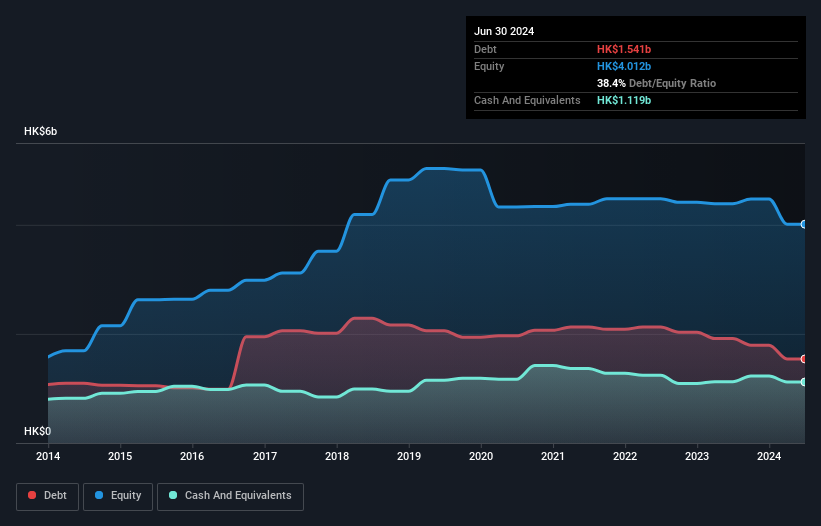Wong's International Holdings (HKG:99) Takes On Some Risk With Its Use Of Debt
Warren Buffett famously said, 'Volatility is far from synonymous with risk.' When we think about how risky a company is, we always like to look at its use of debt, since debt overload can lead to ruin. As with many other companies Wong's International Holdings Limited (HKG:99) makes use of debt. But should shareholders be worried about its use of debt?
When Is Debt A Problem?
Generally speaking, debt only becomes a real problem when a company can't easily pay it off, either by raising capital or with its own cash flow. If things get really bad, the lenders can take control of the business. However, a more frequent (but still costly) occurrence is where a company must issue shares at bargain-basement prices, permanently diluting shareholders, just to shore up its balance sheet. Of course, debt can be an important tool in businesses, particularly capital heavy businesses. When we examine debt levels, we first consider both cash and debt levels, together.
See our latest analysis for Wong's International Holdings
How Much Debt Does Wong's International Holdings Carry?
The image below, which you can click on for greater detail, shows that Wong's International Holdings had debt of HK$1.54b at the end of June 2024, a reduction from HK$1.91b over a year. However, it also had HK$1.12b in cash, and so its net debt is HK$421.9m.

How Healthy Is Wong's International Holdings' Balance Sheet?
According to the last reported balance sheet, Wong's International Holdings had liabilities of HK$1.51b due within 12 months, and liabilities of HK$966.8m due beyond 12 months. On the other hand, it had cash of HK$1.12b and HK$693.3m worth of receivables due within a year. So its liabilities total HK$663.2m more than the combination of its cash and short-term receivables.
This deficit is considerable relative to its market capitalization of HK$669.9m, so it does suggest shareholders should keep an eye on Wong's International Holdings' use of debt. Should its lenders demand that it shore up the balance sheet, shareholders would likely face severe dilution.
In order to size up a company's debt relative to its earnings, we calculate its net debt divided by its earnings before interest, tax, depreciation, and amortization (EBITDA) and its earnings before interest and tax (EBIT) divided by its interest expense (its interest cover). Thus we consider debt relative to earnings both with and without depreciation and amortization expenses.
Wong's International Holdings's net debt is sitting at a very reasonable 1.8 times its EBITDA, while its EBIT covered its interest expense just 3.4 times last year. While these numbers do not alarm us, it's worth noting that the cost of the company's debt is having a real impact. Sadly, Wong's International Holdings's EBIT actually dropped 9.5% in the last year. If earnings continue on that decline then managing that debt will be difficult like delivering hot soup on a unicycle. When analysing debt levels, the balance sheet is the obvious place to start. But it is Wong's International Holdings's earnings that will influence how the balance sheet holds up in the future. So if you're keen to discover more about its earnings, it might be worth checking out this graph of its long term earnings trend.
Finally, a company can only pay off debt with cold hard cash, not accounting profits. So it's worth checking how much of that EBIT is backed by free cash flow. Over the most recent three years, Wong's International Holdings recorded free cash flow worth 58% of its EBIT, which is around normal, given free cash flow excludes interest and tax. This cold hard cash means it can reduce its debt when it wants to.
Our View
On the face of it, Wong's International Holdings's EBIT growth rate left us tentative about the stock, and its level of total liabilities was no more enticing than the one empty restaurant on the busiest night of the year. But on the bright side, its conversion of EBIT to free cash flow is a good sign, and makes us more optimistic. Looking at the balance sheet and taking into account all these factors, we do believe that debt is making Wong's International Holdings stock a bit risky. That's not necessarily a bad thing, but we'd generally feel more comfortable with less leverage. The balance sheet is clearly the area to focus on when you are analysing debt. However, not all investment risk resides within the balance sheet - far from it. For example Wong's International Holdings has 3 warning signs (and 1 which doesn't sit too well with us) we think you should know about.
Of course, if you're the type of investor who prefers buying stocks without the burden of debt, then don't hesitate to discover our exclusive list of net cash growth stocks, today.
Have feedback on this article? Concerned about the content? Get in touch with us directly. Alternatively, email editorial-team (at) simplywallst.com.
This article by Simply Wall St is general in nature. We provide commentary based on historical data and analyst forecasts only using an unbiased methodology and our articles are not intended to be financial advice. It does not constitute a recommendation to buy or sell any stock, and does not take account of your objectives, or your financial situation. We aim to bring you long-term focused analysis driven by fundamental data. Note that our analysis may not factor in the latest price-sensitive company announcements or qualitative material. Simply Wall St has no position in any stocks mentioned.
 Index Options
Index Options CME Group
CME Group Nasdaq
Nasdaq Cboe
Cboe TradingView
TradingView Wall Street Journal
Wall Street Journal